中考六种时态的复习(重要)
- 格式:doc
- 大小:68.00 KB
- 文档页数:14

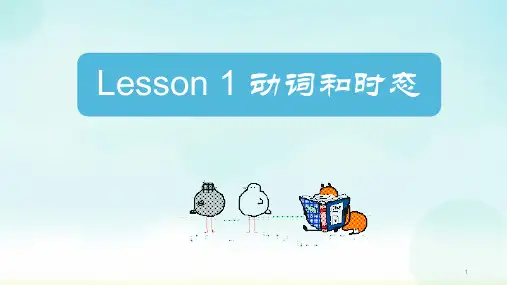

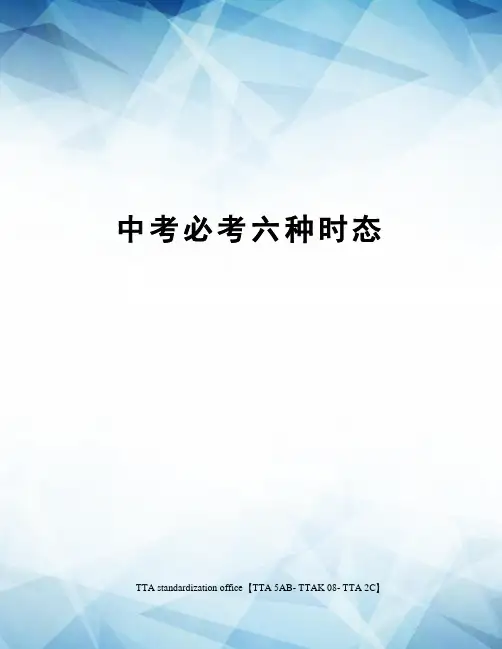
中考必考六种时态 TTA standardization office【TTA 5AB- TTAK 08- TTA 2C】中考必考六种时态一、一般现在时: 1.概念:经常、反复发生的动作或行为及现在的某种状况.2.时间状语:always, usually, often, sometimes, every week (day, year, month…), once a week, on Sundays, 等3.基本结构:动词原形 /主语为第三人称单数,动词上要改为第三人称单数形式即be动词为is,实意动词+s/es(特别注意此考点)4.否定形式:am/is/are+not;此时态的谓语动词若为行为动词,则在其前加don't,如主语为第三人称单数,则用doesn't,同时还原行为动词.5.一般疑问句:把be动词放于句首;用助动词do提问,如主语为第三人称单数,则用does,同时,还原行为动词. 例句:. It seldom snows here. He is always ready to help others. Action speaks louder than words.二、一般过去时: 1.概念:过去某个时间里发生的动作或状态;过去习惯性、经常性的动作、行为.2.时间状语:ago, yesterday, the day before yesterday, last week, last(year, night, month…), in 1989, just now, at the age of 5, one day, long long ago, once upon a time, etc.3.基本结构:be动词;行为动词的过去式及动词+ed.4.否定形式:was/were +not; 在行为动词前加didn't,同时还原行为动词.5.一般疑问句:was或were放于句首;用助动词do的过去式did 提问,同时还原行为动词. 例句:She often came to help us in those days. I didn't know you were so busy.三、现在进行时: 1.概念:表示现阶段或说话时正在进行的动作及行为.2.时间状语:now, look, listen, these days, etc.3.基本结构:am/is/ are+ doing4.否定形式:am/is/are +not+ doing.5.一般疑问句:把be动词放于句首. 例句: How are you feeling todayHe is doing well in his lessons.四、过去进行时: 1.概念:表示过去某段时间或某一时刻正在发生或进行的行为或动作.2.时间状语:at this time yesterday, at that time或以when/while引导的谓语动词是一般过去时的时间状语等.3.基本结构:was/were+doing4.否定形式:was/were + not + doing.5.一般疑问句:把was或were放于句首.例句:At that time she was working in a PLA unit. When he came in, I was reading a newspaper.五、现在完成时: 1.概念:过去发生或已经完成的动作对现在造成的影响或结果,或从过去已经开始,持续到现在的动作或状态.2.时间状语:already, yet, never, ever, just, recently, lately, before,so far,次数(如:once, twice, three times…),since+过去的时间或含有过去式的句子,for+一段时间(用how long 提问),in the past few years, etc.3.基本结构:have/has + done4.否定形式:have/has + not +done.5.一般疑问句:have或has. 例句:I've written an article. The countryside has changed a lot in the past few years.六、一般将来时:1.概念:表示将要发生的动作或存在的状态及打算、计划或准备做某事.2.时间状语:tomorrow, next day(week, month, year…),soon, in a few minutes, in +2017将来的年份,in+ 一段时间(用how soon提问)译为:一段时间之后,the day after tomorrow, etc...3.基本结构:am/is/are/going to + do;will/shall + do.4.否定形式:was/were + not; 在行为动词前加didn't,同时还原行为动词.5.一般疑问句:be放于句首;will/shall提到句首.例句:They are going to have a competition with us in studies.It is going to rain.。

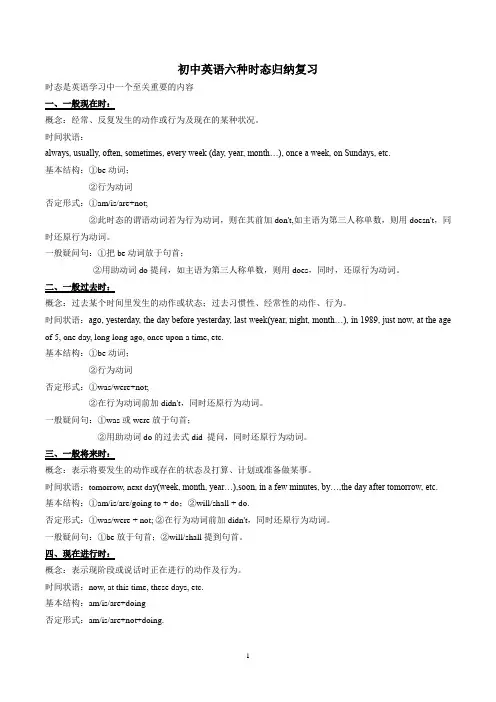
初中英语六种时态归纳复习时态是英语学习中一个至关重要的内容一、一般现在时:概念:经常、反复发生的动作或行为及现在的某种状况。
时间状语:always, usually, often, sometimes, every week (day, year, month…), once a week, on Sundays, etc.基本结构:①be动词;②行为动词否定形式:①am/is/are+not;②此时态的谓语动词若为行为动词,则在其前加don't,如主语为第三人称单数,则用doesn't,同时还原行为动词。
一般疑问句:①把be动词放于句首;②用助动词do提问,如主语为第三人称单数,则用does,同时,还原行为动词。
二、一般过去时:概念:过去某个时间里发生的动作或状态;过去习惯性、经常性的动作、行为。
时间状语:ago, yesterday, the day before yesterday, last week(year, night, month…), in 1989, just now, at the age of 5, one day, long long ago, once upon a time, etc.基本结构:①be动词;②行为动词否定形式:①was/were+not;②在行为动词前加didn't,同时还原行为动词。
一般疑问句:①was或were放于句首;②用助动词do的过去式did 提问,同时还原行为动词。
三、一般将来时:概念:表示将要发生的动作或存在的状态及打算、计划或准备做某事。
时间状语:tomorrow, next da y(week, month, year…),soon, in a few minutes, by…,the day after tomorrow, etc.基本结构:①am/is/are/going to + do;②will/shall + do.否定形式:①was/were + not; ②在行为动词前加didn't,同时还原行为动词。
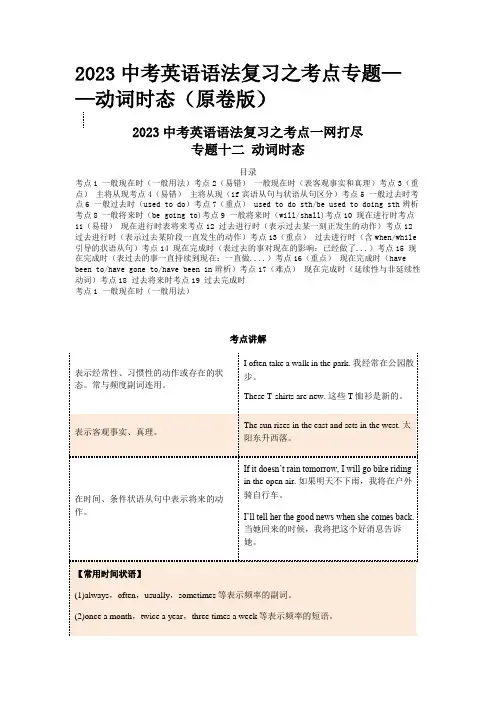
2023中考英语语法复习之考点专题——动词时态(原卷版)2023中考英语语法复习之考点一网打尽专题十二动词时态目录考点1 一般现在时(一般用法)考点2(易错)一般现在时(表客观事实和真理)考点3(重点)主将从现考点4(易错)主将从现(if宾语从句与状语从句区分)考点5 一般过去时考点6 一般过去时(used to do)考点7(重点) used to do sth/be used to doing sth辨析考点8 一般将来时(be going to)考点9 一般将来时(will/shall)考点10 现在进行时考点11(易错)现在进行时表将来考点12 过去进行时(表示过去某一刻正发生的动作)考点12 过去进行时(表示过去某阶段一直发生的动作)考点13(重点)过去进行时(含when/while 引导的状语从句)考点14 现在完成时(表过去的事对现在的影响:已经做了...)考点15 现在完成时(表过去的事一直持续到现在:一直做....)考点16(重点)现在完成时(have been to/have gone to/have been in辨析)考点17(难点)现在完成时(延续性与非延续性动词)考点18 过去将来时考点19 过去完成时考点1 一般现在时(一般用法)考点讲解1.(2021·上海松江·二模)Tim likes watching films. He _________ to the cinema with his girlfriend once a week.A.goes B.is going C.has gone D.will go2.(2020·湖北恩施)I hear that it often ________ in Sichuan and there are usually floods, especially in summer.A.rains B.rained C.will rain3.(2021·北京房山·二模)Mary ________ her grandparents every weekend.A.visits B.was visiting C.is visiting D.has visited4.(2021·广西桂林)The zebra eats grass, but it ________ eat meat.A.doesn’t B.didn’t C.don’t5.(2021·黑龙江·齐齐哈尔市碾子山区教师进修学校一模)—Do you like the flower? —Yes. It ________ sweet.A.is smelling B.smells C.smelt考点2(易错)一般现在时(表客观事实和真理)考点讲解精选练习6.(2020·天津红桥·二模)In the past, people didn't know the earth ________round the sun. A.going B.goes C.will go D.go7.(2021·吉林长春·模拟预测)The teacher told us that the sun ________ in the east. A.rises B.rise C.rose D.rising考点3(重点)主将从现考点讲解精选练习8.(2021·四川乐山)—What’s your plan for the summer holiday?—I’ll go to Chendu as soon as the school term ___________.A.end B.ends C.will end9.(2021·广西河池)Mrs. Green will take her son to the amusement park if she ________ the tickets.A.got B.gets C.is getting D.will get10.(2021·辽宁丹东)We can’t avoid traffic accidents unless everyone ________ the rules. A.follows B.breaks C.will follow D.will break考点4(易错)主将从现(if宾语从句与状语从句区分)考点讲解精选练习11.(2021·辽宁鞍山)—Tina wants to know if you ________ to the park with us tomorrow. —I’d love to. But if it ________, I may go to the library instead.A.go; will rain B.go; rains C.will go; rains D.will go; will rain12.(2020·黑龙江牡丹江)—I wonder if we ________a farewell party next week. —If we________it, I will call you.A.will have ; have B.have;will have C.will have; will have13.(2021·黑龙江哈尔滨)—I wonder if you ________ us for the English party tomorrow. —If I ________ free, I will go with you.A.will join, am B.will join, will be C.join, am考点5 一般过去时考点讲解精选练习14.(2021·广西贵港)—Where does Bill live? —He ________ me his address, but I can’t remember it now.A.tells B.told C.is telling D.will tell15.(2021·四川达州)— Alice has gone out. — Oh, has she? What time ________ she________?A.has; gone B.will; go C.did; go D.is; going16.(2021·江苏徐州)In my school days, I ________ a lot of reading in English every day. That was how I learned English at that time.A.do B.did C.have done D.will do17.(2021·重庆)Last Sunday my brother and I ________ our grandparents.A.will visit B.visits C.visit D.visited18.(2021·内蒙古兴安盟)— Have you ever been to Shanghai? — Of course. Actually, I________ there for six years, but now I live in Beijing.A.worked B.was working C.would work D.have worked考点6 一般过去时(used to do)考点讲解精选练习19.Mr Jiang isn’t as busy as before because there ___________no home robot to help him.A.used to be B.may be C.used to have D.may have20.I ________ in this small mountain village when I was a child.A.use to live B.used to living C.used to live D.used to life21.(2019·江苏镇江)Yao Ming, a basketball giant , ___________ water polo when he was young.A.is playing B.used to play C.is used to playing D.was playing考点7(重点) used to do sth/be used to doing sth辨析考点讲解精选练习22.(2020·湖南益阳)Diana used to _________ to work, but now she is used to ________ because the road is crowded and she wants to keep fit.A.drive; walk B.drive; walking C.driving; walk23.Dick __________ in America, but he has been ___________ Chinese food since he moved to China.A.used to live; used to eating B.is used to live; used to eat C.is used to live; used to eating D.used to living; used to eat24.—How does your brother go to school? —He ___________ ride a bike, but now he__________ there to keep fit.A.used to; is used to walk B.used to; is used for walking C.was used to; is used to walking D.used to; is used to walking考点8 一般将来时(be going to)考点讲解一般将来时表示将来某个时间要发生的动作,事情或存在的状态,也表示将来经常或反复发生的动作或事情。
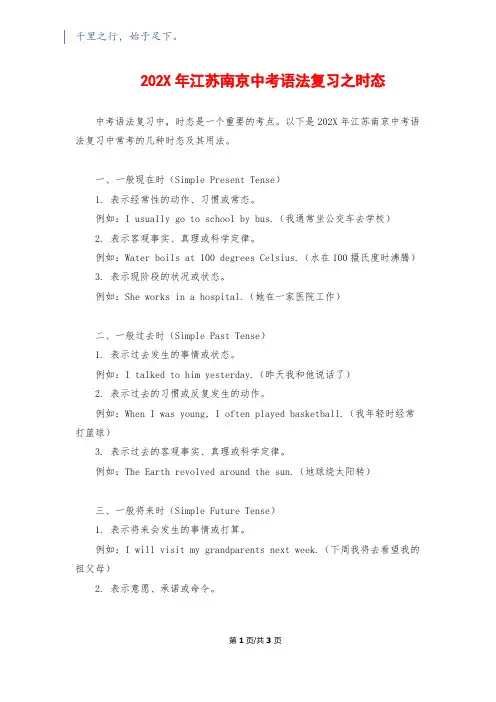
千里之行,始于足下。
202X年江苏南京中考语法复习之时态中考语法复习中,时态是一个重要的考点。
以下是202X年江苏南京中考语法复习中常考的几种时态及其用法。
一、一般现在时(Simple Present Tense)1. 表示经常性的动作、习惯或常态。
例如:I usually go to school by bus.(我通常坐公交车去学校)2. 表示客观事实、真理或科学定律。
例如:Water boils at 100 degrees Celsius.(水在100摄氏度时沸腾)3. 表示现阶段的状况或状态。
例如:She works in a hospital.(她在一家医院工作)二、一般过去时(Simple Past Tense)1. 表示过去发生的事情或状态。
例如:I talked to him yesterday.(昨天我和他说话了)2. 表示过去的习惯或反复发生的动作。
例如:When I was young, I often played basketball.(我年轻时经常打篮球)3. 表示过去的客观事实、真理或科学定律。
例如:The Earth revolved around the sun.(地球绕太阳转)三、一般将来时(Simple Future Tense)1. 表示将来会发生的事情或打算。
例如:I will visit my grandparents next week.(下周我将去看望我的祖父母)2. 表示意愿、承诺或命令。
第1页/共3页锲而不舍,金石可镂。
例如:I promise that I will help you with your homework.(我保证我会帮你做作业)四、现在进行时(Present Continuous Tense)1. 表示现在正在进行的动作。
例如:He is playing football now.(他正在踢足球)2. 表示现阶段的临时性情况或趋势。
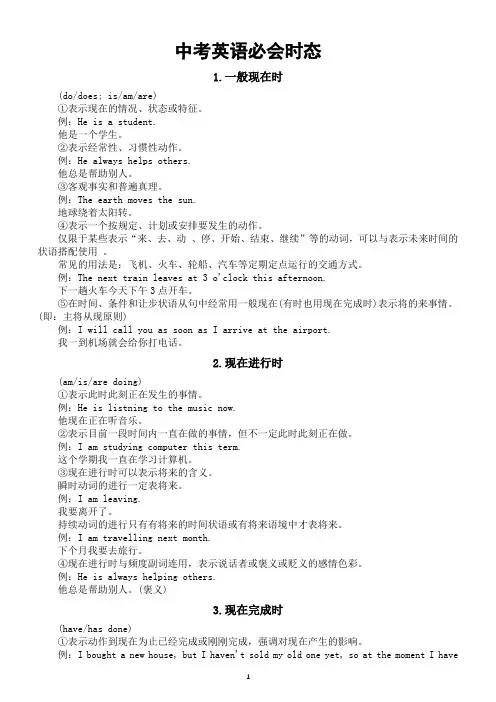
中考英语必会时态1.一般现在时(do/does; is/am/are)①表示现在的情况、状态或特征。
例:He is a student.他是一个学生。
②表示经常性、习惯性动作。
例:He always helps others.他总是帮助别人。
③客观事实和普遍真理。
例:The earth moves the sun.地球绕着太阳转。
④表示一个按规定、计划或安排要发生的动作。
仅限于某些表示“来、去、动、停、开始、结束、继续”等的动词,可以与表示未来时间的状语搭配使用。
常见的用法是:飞机、火车、轮船、汽车等定期定点运行的交通方式。
例:The next train leaves at 3 o'clock this afternoon.下一趟火车今天下午3点开车。
⑤在时间、条件和让步状语从句中经常用一般现在(有时也用现在完成时)表示将的来事情。
(即:主将从现原则)例:I will call you as soon as I arrive at the airport.我一到机场就会给你打电话。
2.现在进行时(am/is/are doing)①表示此时此刻正在发生的事情。
例:He is listning to the music now.他现在正在听音乐。
②表示目前一段时间内一直在做的事情,但不一定此时此刻正在做。
例:I am studying computer this term.这个学期我一直在学习计算机。
③现在进行时可以表示将来的含义。
瞬时动词的进行一定表将来。
例:I am leaving.我要离开了。
持续动词的进行只有有将来的时间状语或有将来语境中才表将来。
例:I am travelling next month.下个月我要去旅行。
④现在进行时与频度副词连用,表示说话者或褒义或贬义的感情色彩。
例:He is always helping others.他总是帮助别人。
(褒义)3.现在完成时(have/has done)①表示动作到现在为止已经完成或刚刚完成,强调对现在产生的影响。
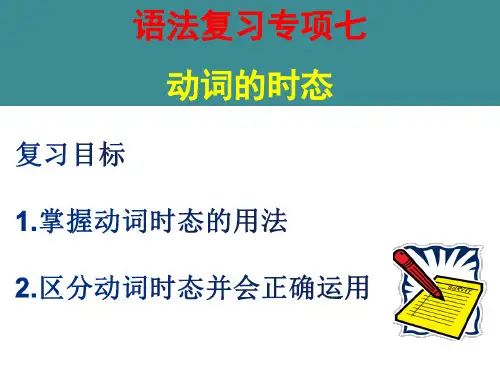
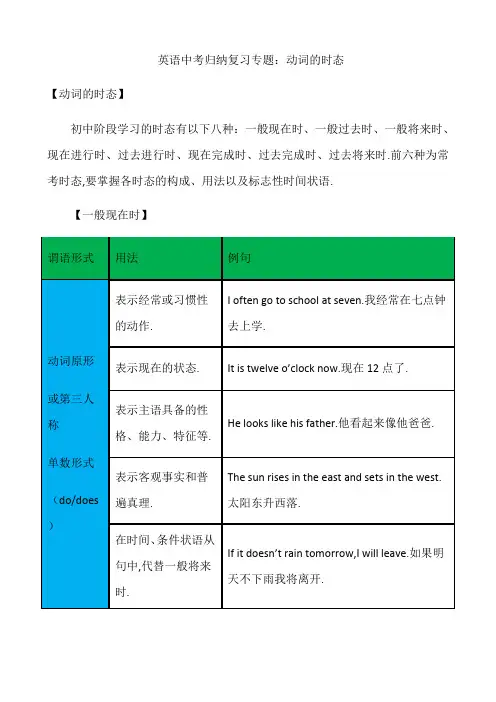
英语中考归纳复习专题:动词的时态【动词的时态】初中阶段学习的时态有以下八种:一般现在时、一般过去时、一般将来时、现在进行时、过去进行时、现在完成时、过去完成时、过去将来时.前六种为常考时态,要掌握各时态的构成、用法以及标志性时间状语.【一般现在时】【考点训练1】1.My father is a teacher and he _________ (teach) in a middle school.2.Yesterday the teacher told us the earth _______ (go) around the sun.3.—When shall we begin our meeting?—We’ll begin it when Helen ___ . ()esB.cameC.will comee4.—How do you usually go to school?—I usually ___ to school on foot. ()A.goB.wentC.was goingD.will go答案:teaches goes A A【一般过去时】要点提醒:“used to+动词原形”表示过去的习惯或状态.如:Mum used to tell us stories.妈妈过去常给我们讲故事.【考点训练2】1.Mike ________ (not go) to bed until 12 o’clock last night.2.He asked if I _____ (be) a student.3.Will you please say it again?I ___ quite ___ you.()A.don’t;hearB.didn’t;hearC.don’t;heardD.didn’t;heard4.He _____ go out with his parents,but now he ____ staying at home alone. ()ed to;is used toB.is used to;used toe to;is used toed to;used to答案:didn’t go was B A【一般将来时】要点提醒:be going to与will的区别1.be going to 指已计划好的事或思考过的意图、打算,will表示未事先思考或未计划而临时做出的决定.如:I’m going to see him tomorrow.我打算明天去看他.(事先经过思考)I’ll answer the door.我去开门.(未经事先考虑)2.be going to可表示客观迹象表明马上要发生的事,而will则表明说话者的主观意愿.如:Look at the clouds.There is going to be a storm.看看这些云,暴风雨就要来了.(客观迹象表明要发生)I hope it will be warm tomorrow.我希望明天会暖和起来.(主观意愿)3.在含有条件状语从句的复合句的主句中,一般用will,不用be going to. 如:I will come if it doesn’t rain.如果不下雨的话,我就来.【考点训练3】1.____ a concert in our school next Saturday. ()A.There isB.There areC.There will beD.There will have2.If they can arrive by 9:00 am,we ___ a meeting.()A.haveB.will haveC.hadD.would have3.He ___ her a beautiful hat on her next birthday.()A.givesB.gaveC.will givingD.is going to give答案:C B D 【现在进行时】【考点训练4】1.They ____________ (have) a math test in the classroom now.2.Look! He ___________ (lie) on the beach.3.—Pass the raincoat to me.It ___ hard now.—Here you are. ()A.rainB.is rainingC.rainedD.will rain4.—Cathy,can you answer the door?I ___ the room.—I’m coming,Mum. ()A.CleanB.cleanedC.have cleanedD.am cleaning答案:are having is lying B D【过去进行时】He was forever com plaining about something.他老是怨这怨那.要点提醒:1.在含有时间状语从句的复合句中,延续时间较长的动作常用过去进行时,另一个短暂性动作用一般过去时.如:When the UFO landed,I was shopping at the clothes store.当UFO落地时,我正在服装店买衣服.2.表示两个延续性动作在过去某一时刻同时进行,不考虑动作的先后顺序,主句和从句的谓语动词都用过去进行时,连词常用while.如:Tom was doing his homework while I was reading a newspaper.我在看报纸时,汤姆在做作业.【考点训练5】1.Mike and I ___________ (play) basketball at that time yesterday afternoon.2.While Mr.Johnson _______________ (work) in the office,the phone rang.3.The girl ___ for the bus when the rainstorm came.()A.waitedB.have waitedC.is waitingD.was waiting4.—Jenny,I called you at nine last night,but you didn’t pick up.—Oh,I ____ a popular program called Go Fighting!.()A.watchB.watchedC.was watchingD.am watching答案:were playing was working D C【现在完成时】要点提醒:1.have/has been to,have/has gone to与have/has been in(考点讲解详见P74考点1)2.延续性动词与非延续性动词英语中的动词按动作发生的方式、发生过程的长短可分为延续性动词和非延续性动词两种,非延续性动词也可称为短暂性动词或瞬间动词.在现在完成时态中,有时要将非延续性动词转换为延续性动词,这样才能和时间段连用.转换方法如下:(1)将短暂性动词转换为“be+形容词或副词”.请看下表:如:这间商店开门6小时了.The shop has opened for 6 hours.( ×)The shop has been open for 6 hours.( √)(2)有的短暂性动词可以转换为意思相同的延续性动词.请看下表:如:这本书我借了一个月了.I have borrowed the book for one month.( ×)I have kept the book for one month.( √)3.现在完成时与一般过去时的区别现在完成时强调某一动作或状态对现在造成的影响或结果,不能和表示过去的时间状语连用;一般过去时只表示过去的事实,不表示和现在的关系,可以和表示过去的时间状语连用.如I bought a ticket yesterday.我昨天买了一张票.(强调我昨天做的一件事是买票)I have already bought a ticket.我已经买了一张票.(强调我已经有票了,无须再惦记票的事了)4.现在完成时的其他句型【考点训练6】1.—you _____ your homework yet?—Yes.I ______ it a moment ago. ()A.Did;do;finishedB.Have;done;finishedC.Have;done;have finishedD.Will;do;finish2.His father ___ the Party since 1978. ()A.joinedB.has joinedC.was inD.has been in3.Miss Green isn’t in the office.She to the library. ()A.has goneB.wentC.will goD.has been 答案:B D A【过去完成时】had + 过去分词表示在过去的过去发生的动作或存在的状态.I had had three pieces of cake when you arrived.你来的时候我已经吃了三块蛋糕了.表示过去某一动作或状态持续到过去另一时间.The old man had lived in Shanghai for ten years beforeTom came here.汤姆来这儿之前,这个老人已经住在上海十年了.时间标志by the time...,before,when等构成的短语或引导的从句【考点训练7】1.在我们到达电影院之前,电影已经开始了.The film __________ before we _______ to the cinema.2.警察赶到时,小偷已经逃跑了.When the police __________,the thief____________________ .答案:had begun got arrived had run away 【过去将来时】【考点训练8】1.李明说如果布莱恩下个月来中国,他将会很高兴.Li Ming said he ___________ happy if Brian came to China the next month.2.蒂娜说她下周三打算来参加我的生日派对.Tina said she ________________ my birthday party the next Wednesday.答案:would be was going to【中考示例】(2017·广西)If he _____ Guilin,he’ll probably go to Yangshuo. ( )A.visitsB.is visitingC.will visitD.has visited【解析】考查动词的时态.句意:如果他游览桂林,他有可能会去阳朔.if引导条件状语从句时,时态遵循“主将从现”原则,从句中用一般现在时表示将来.【考题热身】1.(2017·甘肃)I promise I ________ (send) you an email to explain all of these tomorrow.2.(2017·甘肃)Be quiet! The patients ______________(sleep).3.(2017·鄂州)Sandy’s grandparents__________________ (marry) for 50 years.4.(2017·台州改编)A true friend always ____________(support) you whenever youare in trouble.5.(2017·宿迁)I ______________(wash) the dishes while my sister was sweeping the floor.6.(2017·云南)—What do you think of your hometown, Kate?—It a lot.It’s more beautiful than before. ()A.has changedB.changesC.will changeD.change7.(2017·武汉)—Linda is not coming for the party tonight.—But she ______!()A.promisesB.promisedC.will promiseD.had promised8.(2017·毕节)It’s nice to see you again.We ___ each other since 2016. ()A.won’t seeB.haven’t seenC.don’t seeD.didn’t see9.(2017·黔东南)If it doesn’t rain this weekend,we ___ a picnic in the Jinquan Park. ()A.haveB.will haveC.have hadD.had10.(2017·上海)Some exchange students ___ with their host families this time yesterday. ()A.are chattingB.will chatC.were chattingD.have chatted11.(2017·重庆B卷)—Where is your uncle?I haven’t seen him for a long time. —He _____ Beijing for about half a year.He moved there in January. ()A.has gone to B.has been toC.has arrived inD.has been in12.(2017·重庆B卷)John and I ___ to visit his grandparents last Sunday afternoon. ()A.goB.wentC.will goD.have gone13.(2017·重庆A卷)In the past few years,many schools ____ the ways of doing morning exercises. ()A.changeB.changesC.will changeD.have changed14.(2017·重庆A卷)As soon as the rain _____ ,they will go out to pick apples. ()A.stopsB.stoppedC.will stopD.is stopping15.(2017·河北)Don’t take the dictionary away.I ___ it. ()eedC.am usingD.have used答案:will send are sleeping have been married supports A B BBCDBDAC。
中考英语专项复习——六种基本时态的教案一、学情分析初中英语学习8种时态,而中考有六种必考时态,学生对这六种经常会混淆在一起。
第一轮总复习已经开始一个多月了了,已经复习了四种时态,另外两种就在本课一起复习。
本课整理了中考六种必考时态的知识点,主要是对中考六种时态知识点的梳理和细化,帮助各位学生理清知识脉络,熟悉答题思路,希望各位学生可以在考试中取得优异成绩!二、教学目标和要求(一)知识目标:掌握六种基本时态的概念、结构及基本用法(二)能力目标:通过在练习中比较学习,学会如何分析句子的时态并能正确运用基本时态写出语法正确的句子和篇章。
(三)情感目标:在学习过程中培养学生克服困难的决心和勇气,培养互助互学的美德三、复习重点和难点(一)重点:六种基本时态的概念、结构及用法;(二)难点:区别六种基本时态并运用。
四、教学过程:Step1 Lead-in1.Listen to a song, The Day You Went Away, and ask the students to find out that how many kinds of tenses are used in this song and what they are.2.Listen to the song again and check the answers with the students.Step2 Presentation1.Show some pictures and ask them to make sentences using the present continuous tensee the present continuous tense to describe a picture.3.Do some exercises to consolidate the present continuous tense.Step3 Consolidation1.Show some pictures about Jane’s life and ask the students to desc ribe the pictures using the simple present tense. Review this tense by doing more exercises.2.Review the simple past tense by finish a text.3.Review the simple future tense.4.Review the past continuous tense by a picture.5.Review the present perfect tense.Step4 Practice1.Ask the students to find the mistake in every sentence and correct it.2.Do more practice to master the six types of tenses.Step5 Summary and homework1.Summarize what we have learned today.2.Homework.四、板书设计中考英语专项复习——六种基本时态Class_________ Name______________ No._________一、学习目标和要求(一)掌握六种基本时态的概念、结构及基本用法(二)通过在练习中比较学习,学会如何分析句子的时态并能正确运用基本时态写出语法正确的句子和篇章。
初中英语动词时态复习I. 一般现在时1. 一般现在时的用法1)表示经常的或习惯性的动作,常与表示频度的副词(always, often, usually, every day 等)连用。
例:He often goes swimming in summer.他夏天经常游泳。
2)表示现在的状态。
例:My father is very busy.我父亲很忙。
3)表示主语具备的性格、特征和能力等。
例: My sister is always ready to help others . 我妹妹总是乐于助人。
4)表示客观真理,客观存在,自然现象。
例:Shanghai lies in the east of China.上海位于中国东部。
5)在条件状语从句中,用一般现在时表示将要发生的动作。
(主将从现)例:I'll tell him the news whe n he comes back.他回来时,我将告诉他这个消息。
2.动词的第三人称词尾变化:当主语是第三人称单数时,谓语动词需加-s或-es:注意:动词have的第三人称单数是has.写出下列动词的单数第三人称形式。
I. cook ______ 2.watch _______ 3.build _________ 4.have _______ 5.wash _______6. enjoy ______7. go _________ 8 receive _____ 9 cry _____ 10. close ________II. drive ______ 12. choose_______ 13. play _______ 14. reach _______巩固练习:1、Lucy likes going skating with her friends. (改写成否定句)2、His watch costs 300 yuan.(变成一般疑问句并否定回答)II. 一般过去时1. 一般过去时的用法yesterday, 1)表示过去某个时间所发生的动作或存在的状态。
一般现在时常与之连用的时间状语有以下频度副词:always,usually,often,sometimes 等,当然,还有every一族,如:every day,every morning,every Sunday等。
除此之外,还有:on Sundays,on Mondays等等。
但在实际应用时,往往上面提到的时间状语,并非都会在句中重复出现,而且还有其它的一些用法。
来看看吧!1. 陈述当前的一个事实。
如:Bill often gets up late. 比尔经常起得晚。
My mother is a doctor. 我妈妈是一名医生。
2. 表示客观事实、普遍的真理。
如:The earth is smaller than the sun. 地球比太阳小。
Three minus one is two. 三减一等于二。
3. 表示一种自然现象。
如:Days are long in summer. 在夏天,白天很长。
Winter comes after spring. 秋去,冬来。
但是,有时,我在一定的情景或场合中,也会别有“用心”。
不信,请你开看看以下的几种情况。
在这里,就背离了表示经常性、习惯性的动作呢!来看看吧!1. 在以here,there开头的句子中,用一般现在时表示正在发生的动作。
如:Look! Here comes the bus. 瞧!公共汽车来了。
2. 部分动词如be, begin, leave, come, go等的一般现在时可以表示按规定、计划或安排预计将要发生的动作或状态。
如:Tomorrow is Saturday. 明天是星期六。
The train leaves for Beijing at seven. 火车将于七点钟开往北京。
3. 一般现在时用于时间状语从句或条件状语从句中,不像平常一样表示经常性、习惯性的动作或状态,而是表示将来时间的动作或状态。
如:If it rains tomorrow, we will stay at home. 如果明天下雨的话,我们将待在家里。
只有在第三人称单数用动词的“三单变化”,其他用动词的原形。
三单变化:(1)直接在动词词尾加-s.ask---asks work---works get---gets stay---stays(2)以字母s, x, ch, sh或o结尾的动词,在词尾直接加-es.watch---watches wish---wishes fix---fixes pass---passesdo---does go---goes(3)以“辅音字母加- y”结尾的动词,要先变y为i再加-es.try---tries study---studies cry---cries fly---flies2.不规则变化:be---- am is are have----has二、一般现在时的用法表示经常性或习惯性的动作或存在的状态;表示客观事实或普遍真理;在时间、条件等状语从句中,用现在时表示将来.当主语是第三人称单数时:1、动词变相应的第三人称单数形式2、肯定句主语+动词s+其它3、否定句主语+doesn't+动词原形+其它4、一般疑问句Does+主语+动词原形+其它5、肯定回答Yes,主语+does 否定回答No,主语+doesn't6、特殊疑问句特殊疑问词+一般疑问句当主语不是第三人称单数时:1、肯定句主语+动词原形+其它2、否定句主语+don't+动词原形+其它3、一般疑问句Do+主语+动词原形+其它4、谓语动词的形式:do/does三、一般现在时的结构牢记四个四,学好过去时四种用法①表示在过去某个时间发生的动作或情况。
例如:I went to school at 7:00 yesterday morning.我昨天早晨七点去上学。
②表示在过去某个时间存在的状态。
例如:She was not at home last night.她昨晚八点没在家。
③表示在过去经常或反复发生的动作,常和often(经常)、always(总是)、sometimes(有时)等表示频率的时间状语连用。
例如:He often had lunch at school last month.他上个月经常在学校吃午饭。
④表示已故的人所做的事情或情况。
例如:Ba Jin wrote a lot of novels for us.巴金写了很多部小说。
四种时间状语①yesterday及相关短语。
例如:yesterday morning/afternoon/evening 昨天上午/下午/晚上。
②“last+ 时间状语”构成的短语。
例如:last night/month/spring/year 昨晚/上个月/去年春天/去年。
③“一段时间+ago”组成的短语。
例如:three days ago 三天以前four years ago四年以前。
④“介词+ 时间名词”组成的短语。
例如:in 1999 在1999年;on the morning of December 25th 在12月25号早上。
四种谓语动词的表现形式① be动词的过去式was、were.例如:She was a teacher five years ago. 她五年前是一名教师。
② 行为动词的过去式,分为规则动词和不规则动词两种。
规则动词的过去式的构成遵循以下四个规则:1)直接在动词后加ed,例如:help-helped; want-wanted等;2)以不发音的字母e结尾时,去掉e加ed (即直接加d) , 例如:like-liked;use-used等;3)以辅音字母y结尾时,把y变成i再加ed, 例如:carry-carried; study-studied 等;4)以重读闭音节结尾,双写最后一个辅音字母再加ed, 例如:stop-stopped;shop-shopped等。
而不规则动词的过去式则需要我们认真下工夫去记了,例如:go-went; come-came; buy-bought等。
③ 连系动词的过去式。
例如:become-became She became angry. 她生气了。
④ 情态动词的过去式+动词原形。
例如:I could swim at the age of five. 我五岁时就会游泳了。
四种句式的构成①一般过去时态的肯定句式“主语+动词过去式+其它”例如:Jenny bought a skirt yesterday. 詹妮昨天买了一件短裙。
②一般过去时态的否定句式“主语+didn’t+动词原形+其它”例如:Jenny didn’t buy a skirt yesterday. 詹妮昨天没有买短裙。
③一般过去时态的一般疑问句式“Did+主语+动词原形+其它”例如:Did Jenny buy a skirt yesterday 詹妮昨天买短裙了吗④一般过去时态的特殊疑问句式“疑问词+did +主语+动词原形+其它”例如:What did Jenny buy yesterday 詹妮昨天买了什么怎么样通过以上的讲解,你对一般过去时态有所了解并能够熟练地运用了吗希望你越学越进步!一般过去时态集中训练营一训练第一关:小小单词难不到我。
请写出下列动词的过去式。
want arrive enjoy shopbuy _ see _ break _ fall参考答案1. wanted2. arrived3. enjoyed4. shopped5. bought6. saw7. broke8. fell1)到底何时才用一般过去时态①句中有明确的表示过去的时间状语,表示在过去某个时间发生的动作或情况。
如:I went to school at 7:00 yesterday morning. 我昨天早晨七点去上学。
②句中有明确的表示过去的时间状语,表示在过去某个时间存在的状态。
如:She was not at home last night. 她昨晚八点没在家。
③表示在过去经常或反复发生的动作,常和often(经常)、always(总是)、sometimes(有时)等表示频率的时间状语连用。
如:He often had lunch at school last month. 他上个月经常在学校吃午饭。
④表示已故的人所做的事情或情况。
如:Ba Jin wrote a lot of novels for us.巴金写了很多部小说。
2)动词过去式后的ed到底发什么音“清读清,浊读浊,元音结尾还读浊,/t/、/d/之后读/id/。
”(可以把一般过去时和现在完成时放在一起对比讲解)一般过去时态小练习请用正确动词形式填空。
1. I _________ an exciting party last weekend. (have)2. She _______ at home yesterday morning. (is)3. Tommy __________ TV at his uncle’s last night.(watch)4. They all _________ to the mountains yesterday morning. (go)5. My friend, Carol, ________for the math test yesterday evening. (study)参考答案1.had2. was3. watched4. went5. Studied一般将来时在英语中,表示将来某个时间要发生的动作或存在的状态,常与tomorrow morning, next year, the day after tomorrow等表示将来的时间状语连用。
1. 助动词will+动词原形在句法中,will在名词或代词的后面常缩写为’ll, will not 常缩写为won’t。
在疑问句中,主语为第一人称I 或We时,常用助动词shall, shall not 缩写为shan’t。
如:She will be back here tomorrow afternoon. 她明天下午将要回到这儿来。
Shall we get to the zoo early tomorrow morning 我们得明天早上早点到达动物园吗2. be going to +动词原形该句式往往表示计划、打算、决定要做的事或将要发生的事。
其中be有人称和数的变化,即am, is , are。
如:I am going to watch a movie. 我打算今晚看电影。
She is going to see her grandpa tomorrow. 她打算明天去看望她的爷爷。